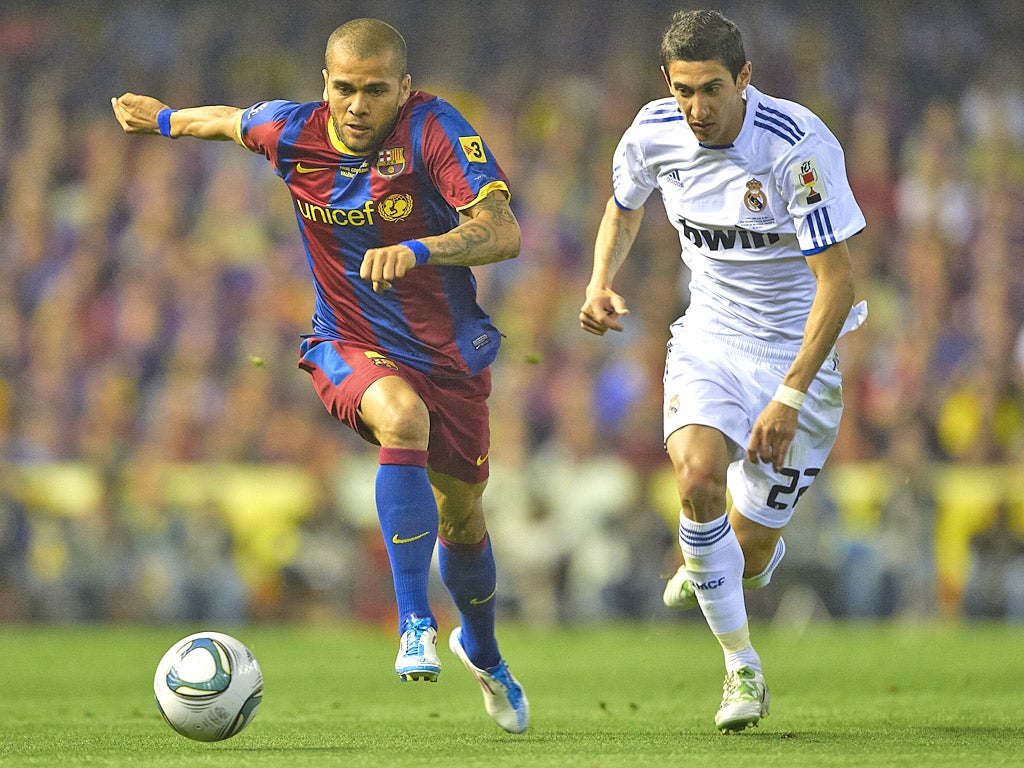Warning for Spanish pair over TV cash
MPs urge Real and Barça to agree redistribution of TV money to help solve financial crisis in La Liga

Spain's centre-right People's Party (PP) plans to push Real Madrid and Barcelona to find consensus with their La Liga rivals on a more equitable distribution of income from television rights, according to PP policymaker Miriam Blasco.
Polls suggest the PP is heading for an election victory over the ruling Socialists on Sunday and Blasco, an Olympic gold medallist in judo and PP sports policy spokesperson in the Senate since 2000, said it was vital the less wealthy clubs had a fair slice of the TV rights pie.
"You have to support the small teams as well, because it's true that the Spanish league would not exist if it was not working for all the clubs," said Blasco, a candidate to become Spain's top sports official after the election.
"It's also true that Real Madrid and Barcelona sell much more than any other club so I agree that they should get the biggest share," added the 47-year-old, who is standing for the lower house in the city of Alicante. "But I believe that the other clubs should get what they deserve because their current revenues are much smaller."
Under the current system, Real and Barça, the world's richest clubs by revenue, negotiate their own deals and between them take half the annual pot of around €600m (£513m).
Barça earned almost €180m from TV contracts in the 2009-10 season, including non-Spanish deals, with Real reaping just under €160m, according to the latest Deloitte Football Money League published in February.
A study last year by Sport+Markt, a consulting firm, showed the pair earned almost 19 times more from TV than the smallest clubs in Spain's top division, by far the biggest gap in the major European leagues.
The richest clubs in the English Premier League, which has a system of collective bargaining and income sharing, earned about 1.7 times more than their smaller rivals.
Seville have fronted a recent bid to persuade Real and Barça to reintroduce collective bargaining and share the cash more equitably, accusing them of "stealing" from their domestic rivals and creating a situation in which only they are capable of winning the league.
The problem has been exacerbated by the financial crisis, which has dented income from advertising and sponsorship and helped tip many clubs into administration.
"Football is living beyond its means and only two clubs are viable as things stand," Blasco said. "There are more and more clubs in administration and if it collapses then Real Madrid and Barcelona will lose, too.
"What we have to do is find a consensus and what we are aiming to do is start a dialogue with everyone and act as intermediaries in the talks."
Speaking at a forum in Doha on yesterday, Barça president Sandro Rosell reiterated the club's stance that they were prepared to accept limited revenue sharing but would not agree to a reduction in their TV rights income.
Club officials have said that from the 2015-16 season onwards, when new TV contracts would come into force, Real and Barça are prepared to share some of the extra money that was negotiated with media companies.
However, analysts have said that would likely cement their dominance for years to come and have noted that in the current economic climate it is not certain that the new contracts will be worth more than current deals.
"We will never reduce in absolute terms our [TV] income, but in a relative sense, yes, it will be reduced," Rosell told the Aspire4Sport conference. "It has to happen step by step, little by little because we have to fulfill our budget," he added.
Blasco, who became the first Spanish woman to win an Olympic gold at the Games in Barcelona in 1992, stressed that the PP was not planning to legislate to force change on Real and Barça.
The professional football league (LFP), which used to negotiate TV contracts on behalf of Spanish clubs, is not functioning correctly and needs a helping hand to sort out the financial problems afflicting soccer, she added.
"We cannot control something that is beyond our influence," Blasco said. "But what is true is that the LFP needs to rethink the way it operates.
"It seems the Spanish soccer federation is working well but there are more problems in the LFP and it is there where we probably need to lend a hand to help it function more effectively."
Turning to Spanish sports in general, Blasco said a new PP government would make a wide-ranging assessment of what changes needed to be made to the current development model to help it adapt to the challenges thrown up by the financial crisis.
While Spanish professional athletes such as Rafa Nadal and the national football and basketball teams are enjoying great success, some of the lower profile Olympic sports are suffering from a lack of funding, she added.
"We have come to realise that the Spanish sports model is 20 years out of date. It was created for Barcelona 1992, but things have changed since then and the model needs updating."
Join our commenting forum
Join thought-provoking conversations, follow other Independent readers and see their replies
Comments
Bookmark popover
Removed from bookmarks